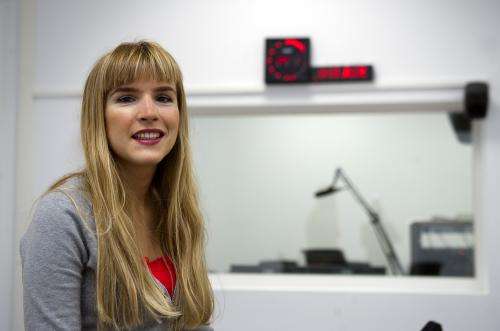Social responsibility, the main motivation of minority-language radio journalism

The UPV/EHU researcher Irati Agirreazkuenaga-Onaindia has developed a new methodology for studying the profiles, working habits and perceptions of Basque and Scottish Gaelic-speaking radio journalists. The study confirms that social responsibility is the main motivation for the EITB and BBC journalists.
Euskadi Irratia was 30 years old last year, and the study covers what the journalists who work in minority languages are like and how they go about their work. So the UPV/EHU researcher Irati Agirreazkuenaga has compared the radio journalists of Euskadi Irratia [EITB-public radio and TV broadcasting corporation of the Basque Autonomous Community] and of BBC Radio nan Gàidheal of Scotland. The Scottish radio station set up in 1985, around the same time as Euskadi Irratia, is the only radio station that broadcasts in Gaelic 24 hours a day.
Agirreazkuenaga has studied firstly who the Basque-speaking and Scottish Gaelic-speaking radio journalists are and what their vision with respect to their work is, and secondly, how they structure their production processes; the study involves the journalists of Euskadi Irratia and BBC Radio nan Gàidheal of Scotland. That is why she combined qualitative tools (observations and one-to-one interviews) and quantitative ones (questionnaires), which has contributed added value to her research work.
Social responsibility
Although there are methodologies, surveys and indicators for analysing journalism, most of them are geared towards the mainstream languages and, as a result, the other languages get passed over because the methodologies are not in themselves valid for analysing journalists who work in minority languages. That is why Agirreazkuenaga wanted to "develop her own methodology". In the case of the two minority-language radio stations, Euskadi Irratia and the BBC's Radio nan Gàidheal, she wanted to know what influence is exerted by the language when working in them. On Euskadi Irratia, for example, two or three generations coexist, as they do on Radio nan Gàidheal. Despite the fact that each generation perceives the language differently, "the journalist gives preference to the communicative dynamic or strategy over language criteria, which reaffirms his or her professionalism," asserts Agirreazkuenaga. On the other hand, the conclusion is that the trends towards change that exert the most influence on the journalists' attitudes are their capacity to influence society and the perception held by other journalists about their work, in other words, social responsibility. So, within the competition existing with other mass media, the greatest motivation of the EITB and BBC journalists to improve their work and demand greater resources and greater autonomy is the need to win the approval and support of society. So, for example, Euskadi Irratia was the radio station with the biggest listenership in Gipuzkoa in 2012, above its competitors in Spanish.
As Agirreazkuenaga points out, specialised journalists perceive greater autonomy when it comes to selecting content on one radio station as well as on the other. The greater the journalist's specialisation is, the greater his/her independence is as regards his/her editors and heads of programming; their potential for suggesting stories is also greater. Agirreazkuenaga was also able to confirm that the perception of the journalists about their autonomy in the way they deal with the stories is greater among those who assert they have enough time to devote to their work; in other words, "the more time they have to tackle the content, the greater their perception of autonomy is," she pointed out. So "theme specialisation of the journalists is fundamental when it comes to addressing three of the most important challenges today: autonomy, lack of time, and the use of a range of sources," said Agirreazkuenaga.
At the BBC, the journalists working in Scottish Gaelic also undertake to produce the news programmes for television, while on Euskadi Irratia they only work for the radio. For this reason, the Radio nan Gàidheal journalists say that their television work benefits their radio work, because that way they can avail themselves of first-hand sources and also have the chance to escape from the desktop journalism that is becoming so widespread; this affords them greater mobility and flexibility.
As regards their level of satisfaction, the following are taken into consideration: being able to have enough time to develop the main factors that have a positive influence on the journalists' level of satisfaction, being able to exercise autonomy with respect to the editorial line, and the sensation of enjoying the support of the corporation. This study concurs with the assertions of other authors and, contrary to widespread opinion during the 1960s, concludes that personal satisfaction has positive repercussions on professionalism.
Provided by Elhuyar Fundazioa
















